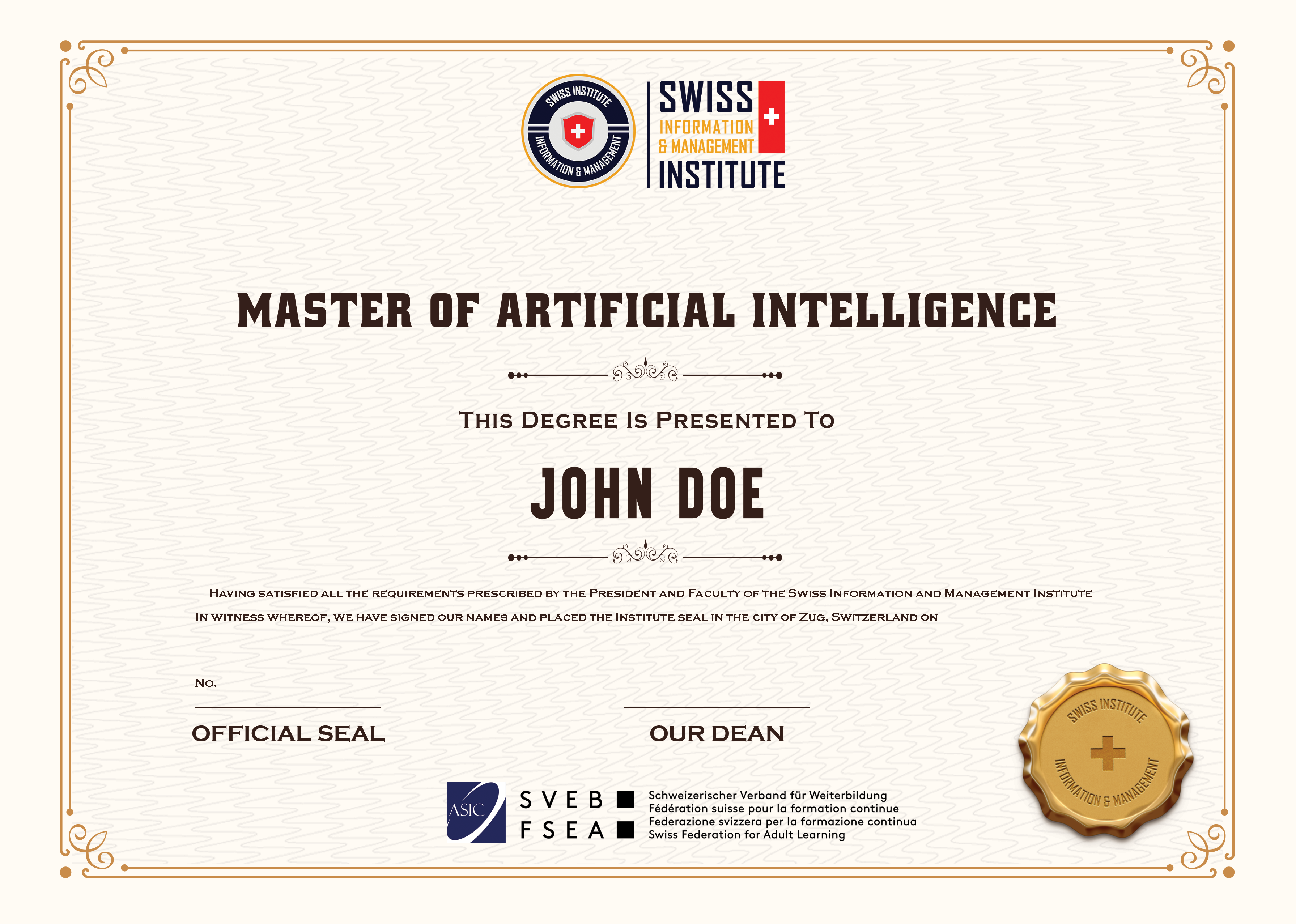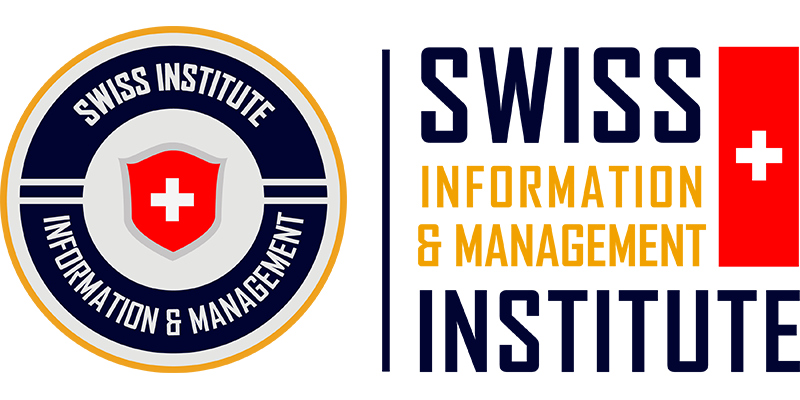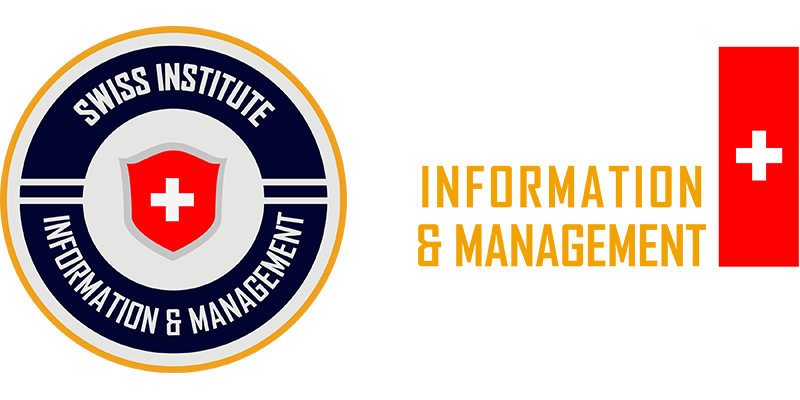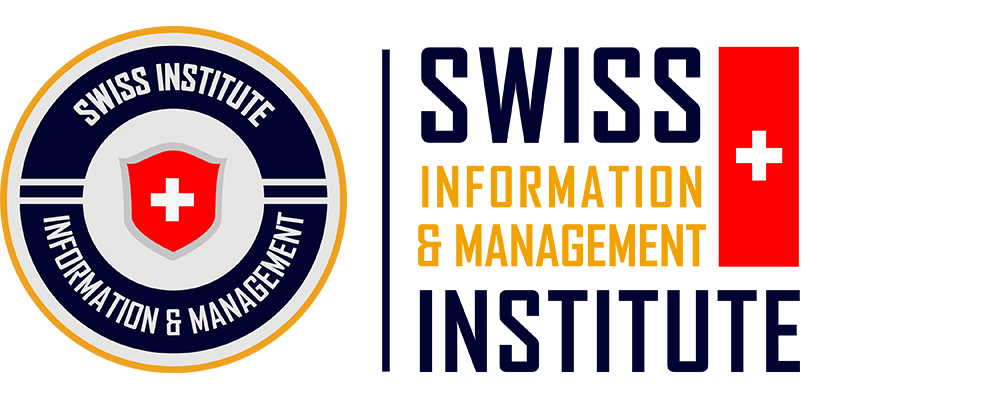Master of Artificial Intelligence
The only Master of Artificial Intelligence program in Switzerland aligned with the National Occupational Standard
The Master of Artificial Intelligence is an excellent choice for professionals looking to lead in the fast-paced and ever-evolving world of artificial intelligence and emerging technologies. Modern AI programs go beyond theoretical foundations; they are designed to empower learners with hands-on expertise to develop, implement, and manage AI-driven solutions that solve real-world problems and foster innovation across diverse industries.
This program, developed by the IT Institute (a member of SIMI Swiss), is thoughtfully crafted to deliver a world-class educational experience. As one of the first programs to align with the European National Occupational Standard, it provides students with a prestigious master’s degree from SIMI Swiss while equipping them with critical knowledge and skills to validate their technical and strategic AI capabilities.
Designed for working professionals, SIMI and its local academic partners offer academic and English language support, ensuring students are well-prepared for success. Students also benefit from the Swiss Colloquium and various networking opportunities to expand their professional and social connections.
Along with globally recognized qualification, the SIMI Swiss Master program understands what students need:
- Fully Accredited & Recognized
- The Swiss Student Card confirms official Swiss student status and eligibility with SIMI Swiss
- Certified & Micro-Credentials Included
- Multiple Qualifications from SIMI & Prestigious Universities
- Stay updated with the latest trends
- Flexible Learning Model
- Expand your business network
- Academic Support While Studying
- Tuition fee support provided by Swiss EduFund
Dual Qualifications within an Master of Artificial Intelligence Program:
- Master of Artificial Intelligence from Swiss Information and Management Institute
- Level 7 Diploma in Artificial Intelligence from OTHM, an Ofqual-regulated Awarding Body in the UK (610/4802/1)
International Accreditation
SIMI is accredited at both the institutional and programmatic levels by ASIC, HEAD, ISO 21001:2018, OTHM, and Qualifi, which is recognized by Ofqual.
Dual Qualification with OTHM
The program is widely recognized by the business community and partners, helping to optimize the use of the diploma after graduation.
Swiss EduFund
EduFund tailors financial aid packages based on the applicant’s talent, awards, English proficiency, and entry requirements.
Academic & Research Support
The academic, research and language support system helps students overcome challenges so they can focus solely on excelling in their studies.
Courses & Learning Outcomes
1. Introduction to Artificial Intelligence (T/651/3604)
Overview
- Focuses on the foundational concepts, history, and applications of artificial intelligence (AI) across industries.
- Examines the role of AI in solving problems, automating tasks, and driving innovation in the modern world.
Unit Aims
- Understand the fundamental concepts and approaches in AI.
- Be able to apply search algorithms in AI problem-solving.
- Understand the principles of knowledge representation and reasoning in AI.
- Be able to apply machine learning techniques in AI.
- Understand the ethical and societal implications of AI.
Course Details
This course is accredited and mapped to National Occupational Standards. It can also be accumulated towards earning a Master Award from SIMI Swiss if taken independently.
- View details on Learning Outcomes, Topics, and Suggested Readings HERE.
2. Artificial Intelligence and Sustainability (D/651/3607)
Overview
- Explores how AI can address global sustainability challenges, including resource management, climate change, and environmental protection.
- Focuses on innovative AI-driven solutions that promote sustainable practices and ethical growth.
Unit Aims
- Develop the ability to analyze the role of AI in promoting sustainability and environmental responsibility.
- Critically evaluate AI applications in addressing sustainability challenges.
- Understand tools and approaches for implementing AI-driven sustainable solutions.
Course Details
This course is accredited and mapped to National Occupational Standards. It can also be accumulated towards earning a Master Award from SIMI Swiss if taken independently.
- View details on Learning Outcomes, Topics, and Suggested Readings HERE.
3. Ethics, Fairness and Explanation in Artificial Intelligence (F/651/3608)
Overview
- Examines ethical challenges in AI, including fairness, transparency, bias mitigation, and explainability of AI decisions.
- Focuses on the development of responsible AI systems that align with societal and regulatory expectations.
Unit Aims
- Develop the ability to analyze ethical and fairness issues in AI applications.
- Critically evaluate strategies for ensuring transparency, bias reduction, and accountability in AI.
- Understand tools and approaches for building explainable and ethical AI systems.
Course Details
This course is accredited and mapped to National Occupational Standards. It can also be accumulated towards earning a Master Award from SIMI Swiss if taken independently.
- View details on Learning Outcomes, Topics, and Suggested Readings HERE.
4. Deep Learning (T/651/3613)
Overview
- Focuses on advanced concepts and techniques in deep learning, including neural networks, model training, and real-world applications.
- Examines how deep learning powers breakthroughs in areas such as computer vision, natural language processing, and predictive analytics.
Unit Aims
- Develop a deep understanding of neural network architectures and training methodologies.
- Critically evaluate deep learning applications in solving complex problems.
- Understand tools and frameworks for designing and implementing deep learning models.
Course Details
This course is accredited and mapped to National Occupational Standards. It can also be accumulated towards earning a Master Award from SIMI Swiss if taken independently.
- View details on Learning Outcomes, Topics, and Suggested Readings HERE.
5. Intelligent Agents (K/651/3600)
Overview
- Explores the design and development of intelligent agents that perceive their environment and make autonomous decisions.
- Focuses on real-world applications of intelligent agents in robotics, automation, and decision-making systems.
Unit Aims
- Develop the ability to analyze the behavior and applications of intelligent agents.
- Critically evaluate strategies for designing and implementing autonomous systems.
- Understand tools and techniques for creating adaptive, intelligent agents in dynamic environments.
Course Details
This course is accredited and mapped to National Occupational Standards. It can also be accumulated towards earning a Master Award from SIMI Swiss if taken independently.
- View details on Learning Outcomes, Topics, and Suggested Readings HERE.
6. Research Methods (T/618/0798)
Overview
- Provides a comprehensive understanding of research methodologies and their application in AI studies.
- Focuses on designing research projects, collecting and analyzing data, and presenting findings effectively.
Unit Aims
- Develop the ability to design and execute AI-focused research projects.
- Critically evaluate research methods and their relevance to solving AI challenges.
- Understand tools and techniques for analyzing data and presenting research outcomes.
Course Details
This course is accredited and mapped to National Occupational Standards. It can also be accumulated towards earning a Master Award from SIMI Swiss if taken independently.
- View details on Learning Outcomes, Topics, and Suggested Readings HERE.
7. Master’s Capstone Project (S/68/9899)
The Capstone Project is a comprehensive, final assignment that Master of Artificial Intelligence students undertake at the end of their program. It is designed to integrate the knowledge and skills they have developed throughout their studies. Unlike traditional exams, the Capstone Project requires students to apply their learning to solve real-world problems or challenges in the field of artificial intelligence.
Key Features of a Capstone Project:
- Practical Application: The project focuses on solving real-world challenges using AI technologies, such as machine learning models, intelligent systems, or AI-driven solutions for industry problems.
- Integration of Knowledge: Students must synthesize concepts from multiple courses, demonstrating their ability to develop and implement AI solutions effectively in a professional context.
- Research Component: The project involves conducting substantial research, gathering and analyzing data, and presenting evidence-based conclusions and innovative recommendations.
- Collaboration: Some projects are team-based, reflecting the collaborative nature of AI development, while others allow students to pursue an individual deep dive into a specialized area of interest.
- Presentation and Defense: Upon completion, students present their project to a panel of faculty members or industry professionals, defending their methodologies, findings, and the impact of their AI solution.
Benefits of a Capstone Project:
- Real-World Experience: Students gain hands-on experience by addressing actual AI challenges, from automation to data-driven problem-solving.
- Skill Development: The project enhances critical thinking, coding, problem-solving, research, and communication skills essential for AI professionals.
- Portfolio Piece: The completed project serves as a showcase of students’ capabilities, strengthening their resumes for job interviews and career opportunities.
- Networking: Projects often involve collaboration with industry experts, providing valuable opportunities to build connections within the AI and tech sectors.
In essence, the Capstone Project is the culmination of the Master of Artificial Intelligence program, allowing students to showcase their expertise, creativity, and readiness to tackle complex AI challenges in professional environments.
Entry requirements & Learning methods
1. Entry Requirements
In addition to the entry requirements, candidates applying to the program are also assessed for their suitability by the admissions committee before joining the program to ensure that they can acquire and benefit from the program.
Entry requirements:
To enroll this program, learners must possess one of the criteria below:
- A Bachelor’s qualification in Majors from accredited universities;
- Or a Level 6 EQF diploma or an equivalent qualification from organizations that are authorized to issue qualifications and have been accredited.
English requirements:
If a learner is not from a predominantly English-speaking country, proof of English language proficiency must be provided.
- Common European Framework of Reference (CEFR) level B2 or equivalent;
- Or A minimum TOEFL score of 101 or IELTS 6.5; Reading and Writing must be at 6.5 or equivalent.
Please note:
- SIMI Swiss does not accept entry qualifications from counterfeit universities, Diploma Mills, or universities accredited by unreliable accreditation agencies.
- SIMI reserves the right to make admissions decisions based on the requirements of recognized agencies and the global quotas of the program.
2. Learning methods
1. Off-Campus Mode
The program is a combination between Live Classes with local tutors (where applicable) for a hybrid learning experience.
- Offering interactive, real-time engagement with instructors.
- Local tutors provide additional guidance to help learners apply theoretical concepts to practical scenarios.
- Ideal for busy professionals seeking flexibility with personalized support.
Learn more about overview of enrolling in online classes at SIMI Swiss [Video HERE]
Learn more about the Effective of SIMI Pedagogy [Video HERE]
2. Fully Online Model
The program is implemented using a combined automated training model that includes:
- Optimized Online Learning System: Designed to enhance the self-study process.
- Bite-Sized Lectures: Lessons are structured in short, manageable modules, enabling students to grasp the content immediately after completing each module.
- Comprehensive Support System: Provides students with the necessary tools and support to efficiently fulfill course requirements.
Learn more about how to use the automated training model at SIMI Swiss [Video HERE]
3. Academic Support
We understand that pursuing an accredited postgraduate program can be both exciting and challenging, especially for busy adult learners. To help you overcome these challenges, we’ve created the SIMI Swiss Supporting Systems, designed to guide you through any difficulties during your studies.
For a full overview of the support available, be sure to watch our informative videos, offering help at every stage of your academic journey.
Program accreditations
1. Accreditation review guidelines by SIMI Swiss
SIMI is the first higher education institute in Zug, Switzerland, to achieve comprehensive international accreditations at both the organizational and program levels. The video below guides you through the step-by-step process of verifying and checking SIMI Swiss's accreditations and recognitions. All SIMI Swiss programs, owned by SIMI Swiss, benefit from these quality standards.
- Watch this video to learn how to verify SIMI Swiss's accreditations and recognitions HERE.
- View the complete accreditation system of SIMI Swiss HERE.
Sample Certificate of Master of Artificial Intelligence:

2. Refer to SIMI Swiss Program information in SVEB Switzerland
SVEB Switzerland (Schweizerischer Verband für Weiterbildung) is the Swiss Federation for Adult Learning and serves as the national umbrella organization for adult education in Switzerland. SVEB is recognized as the leading authority in Switzerland for promoting and supporting lifelong learning and professional development through a wide range of educational programs and certifications.
Benefits of the SIMI Swiss Programs Published in SVEB:
- Officially on the Swiss federal portal: Being published in SVEB gives the SIMI Swiss program official publication in Switzerland, validating its quality and adherence to Swiss educational standards.
- Increased Credibility: Membership and listing with SVEB enhance the credibility of the SIMI program, making it more attractive to prospective students and employers who value SVEB-approved programs.
- Professional Advancement: Programs listed with SVEB are often aligned with the needs of the Swiss job market, increasing graduates' employability and supporting their career progression within Switzerland.
- Access to a Wider Network: Association with SVEB connects the SIMI Swiss program to a broader network of educational institutions, professionals, and employers across Switzerland, offering opportunities for collaboration, networking, and knowledge exchange.
- Compliance with Swiss Standards: SVEB ensures that SIMI Swiss programs meet high educational standards, including up-to-date content, qualified instructors, and effective teaching methods, enhancing the overall learning experience for students.
- Support for Lifelong Learning: SVEB’s focus on adult education means the SIMI Swissprogram aligns with lifelong learning principles, supporting students in their ongoing professional development.
Check the SIMI programs on SVEB HERE.
3. Accreditation of Level 7 Diploma in Artificial Intelligence of OTHM
The Master of Artificial Intelligence program at SIMI Swiss offers a dual degree in partnership with OTHM, the Ofqual UK.Gov awarding body:
- Recognized as an organization by the educational authority of the United Kingdom, Ofqual (UK.Gov). Recognition Number: RN5284. Refer to the recognition information CLICK HERE
- OTHM Level 7 Diploma in Artificial Intelligence is accredited with the Ofqual UK.Gov code 610/4802/1. Refer to the accreditation information CLICK HERE
Reference:
- Guidelines of how to check the recognition of OTHM: CLICK HERE
- Why Level UK offers optimal educational effectiveness for learners?: CLICK HERE
- The meaning of Level System in the labor market in the context of global labor mobility: CLICK HERE
- The meaning of Level System in global diploma recognition: CLICK HERE
You will get
Dual Master
Swiss EduFund
Swiss Student Card
Academic Support
Update Trend
All Master' Programs
Fully Accredited
Multi Recognition
Master of Business Administration
Powered by BizSchool of Zug
Master of Arts in Project Management
Powered by BizSchool of Zug
Master of Arts in Education Management & Innovation Pedagogy
Powered by Swiss EduSchool
Master in TESOL
Powered by Swiss EduSchool
Master of Arts in Human Resource Management and Talent Development
Powered by BizSchool of Zug
Master of International Business Law
Powered by Law Institute of Switzerland
Master of Artificial Intelligence
Powered by IT Institute of Switzerland
Master of Psychology
Powered by Swiss PsySchool
Master of Science in Logistics and Supply Chain Management
Powered by LSCM of Switzerland


